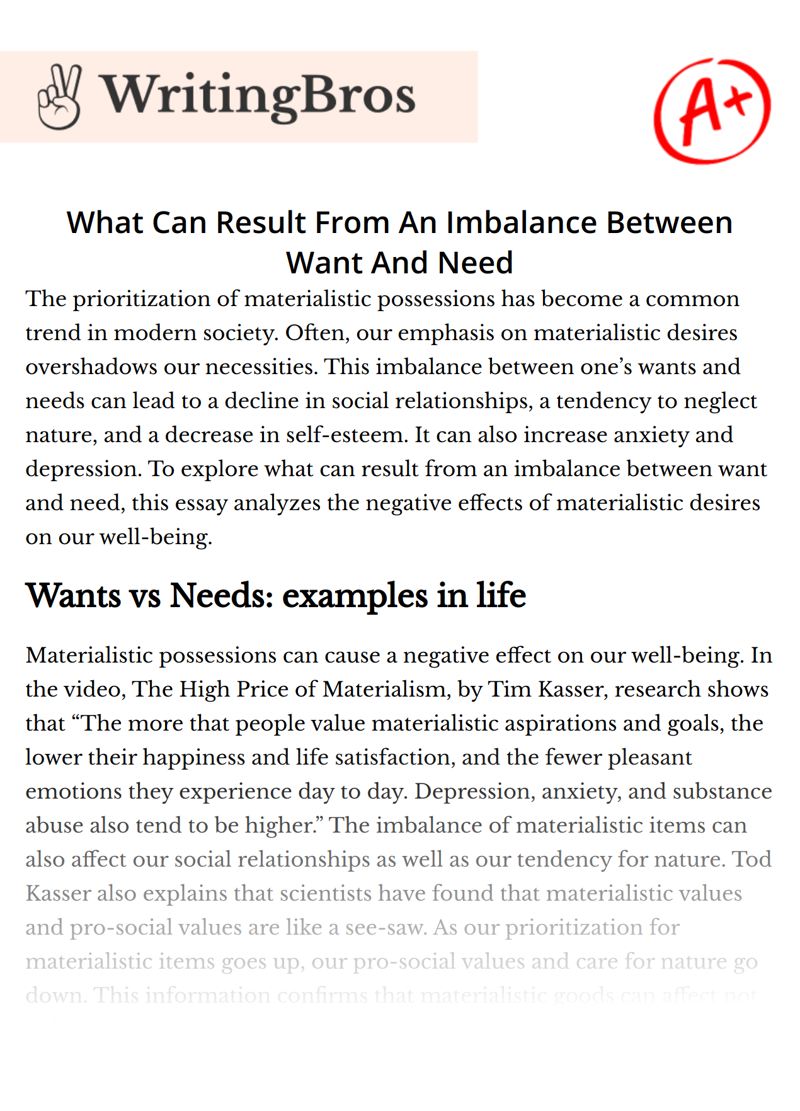What Can Result From An Imbalance Between Want And Need

The prioritization of materialistic possessions has become a common trend in modern society. Often, our emphasis on materialistic desires overshadows our necessities. This imbalance between one’s needs and wants can lead to a decline in social relationships, a tendency to neglect nature, and a decrease in self-esteem. It can also increase anxiety and depression. To explore what can result from an imbalance between want and need, this essay analyzes the negative effects of materialistic desires on our well-being.
Wants vs Needs: examples in life
Materialistic possessions can cause a negative effect on our well-being. In the video, The High Price of Materialism, by Tim Kasser, research shows that “The more that people value materialistic aspirations and goals, the lower their happiness and life satisfaction, and the fewer pleasant emotions they experience day to day. Depression, anxiety, and substance abuse also tend to be higher.” The imbalance of materialistic items can also affect our social relationships as well as our tendency for nature. Tod Kasser also explains that scientists have found that materialistic values and pro-social values are like a see-saw. As our prioritization for materialistic items goes up, our pro-social values and care for nature go down. This information confirms that materialistic goods can affect not only our well-being but also the well-being of others.
Our emotions and peers can influence our choice of purchases. In the article “I came, I saw, I shopped” from the textbook My Perspectives Vol.2, a study shows that “Americans born between the early 1980s and the early 2000s find that peer recommendations influenced many of the participants to make certain purchases.” It also states that “Some of our buying choices seem to be based almost purely on emotions.” Our brains can also affect our decision of purchases. For example, when we think of something we want, it suddenly makes us happy. In the article “Why We’re So Materialistic, Even Though It Doesn’t Make Us Happy” by Thorin Klosowski, researchers have found that when their subjects saw an image of something they like, their nucleus accumbens lit up. So when we see an item we want, pleasure is present, and our brain gets flooded with dopamine. This research demonstrates that there are several influences when it comes to materialistic items such as our brain, emotions, and social relationships.
The extensive emphasis on materialistic items can affect our and others’ well-being due to the lack of necessities present in our lives. The influence of our brain, emotions, and social relationships all contribute to the tendency to make unnecessary purchases that lead to negative emotions. This can cause us to neglect our true necessities, leading to an imbalance between wants and needs. Therefore, it is important to be mindful of our desires and focus on our necessities to maintain a balanced and healthy well-being.
In conclusion, the prioritization of materialistic desires can lead to an imbalance between wants and needs. This imbalance can negatively affect our well-being and the well-being of others. Our emotions, peers, and brain can all influence our choices when it comes to materialistic possessions. By being mindful of our desires and focusing on our necessities, we can maintain a balanced and healthy well-being.
References
- Deci, E. L., & Ryan, R. M. (2014). The importance of autonomy for development and well-being. In Human autonomy in cross-cultural context (pp. 19-37). Springer, Dordrecht.
- Kasser, T. (2016). Materialistic values and goals. Annual Review of Psychology, 67, 489-514.
- Sheldon, K. M., & Kasser, T. (2018). Psychological threats to human well-being: The dark side of human nature. In The Handbook of Well-Being (pp. 121-144). Noba Scholar.
- Vansteenkiste, M., Ryan, R. M., & Deci, E. L. (2020). Self-determination theory and the explanatory role of psychological needs in human well-being. In The Oxford Handbook of Human Motivation (pp. 72-92). Oxford University Press.
- Weinstein, N., Przybylski, A. K., & Ryan, R. M. (2021). Autonomy-supportive tech design: A theoretical model and experimental test. Motivation Science, 7(1), 42-62.
Cite this Essay
To export a reference to this article please select a referencing style below

